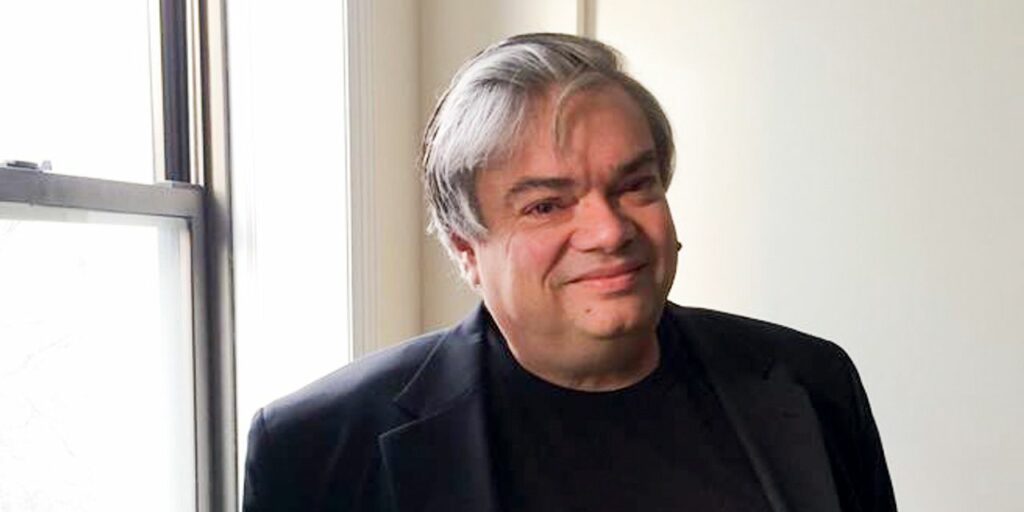Terry Teachout, 1956-2022
The longtime drama critic and blogger is gone at 65.

WSJ (“Terry Teachout, Wall Street Journal Drama Critic, Dies at Age 65“):
Terry Teachout, a prolific New York-based biographer and essayist who wrote exuberantly about drama for The Wall Street Journal, died early Thursday at a friend’s home in Smithtown, N.Y. He was 65 years old.
His companion, Cheril Mulligan, said a cause of death hadn’t yet been determined.
Mr. Teachout had written drama reviews for the Journal regularly since 2003. “He could never be pigeonholed,” said Eric Gibson, editor of the Journal’s Arts in Review pages. “Terry was never predictable.”
He was known for his biographies of Louis Armstrong, Duke Ellington, George Balanchine and H.L. Mencken. He also wrote plays and librettos.
Born Feb. 6, 1956, he grew up in Sikeston, Mo. His father was a hardware salesman, and his mother was a receptionist and secretary. Mr. Teachout evoked his childhood in a 1991 memoir, “City Limits: Memories of a Small-Town Boy.”
Sikeston, he wrote, was “still a place where people salute the flag and don’t ask for receipts, where everybody knows who your parents were and what they did for a living. It is narrow and kind and decent and good, and I am blessed to have been raised in its shabby, forgiving bosom.”
If I ever knew Teachout was the drama critic for WSJ, I had forgotten. I knew him from the early days of blogging, where he was frequently cited around the blogosphere, including at OTB. He apparently started his blog in July 2003, a few months after I launched OTB, and posted as recently as last week.
He was widely cited, including here, for a February 2004 post on the nature of the enterprise:
1. It’s almost impossible to explain what a blog is to someone who’s never seen one. That’s the mark of a true innovation.
2. I know very few people over fifty, and scarcely any over sixty, who “get” blogging.
3. Blogs without links aren’t blogs. Blogs without blogrolls aren’t blogs. Blogs without mailboxes aren’t blogs.
4. The blogosphere is a pure market-but one in which no money changes hands. If you can afford the bandwidth and your ego is strong enough, it doesn’t matter whether anybody wants to read what you have to say. But the more you care about how many people are reading your blog, the more your blogging will be shaped by their approval, whether you get paid or not.
5. Politicians and celebrities rarely make good bloggers. They’re not interested enough in what other people are thinking.
6. Blogging puts professionals and amateurs on an even footing. That’s why so many professional writers dislike and distrust it.
7. The whole point of a blog is that its author controls its content. That’s why no major newspaper will ever be successful at running in-house blogs: the editors won’t allow it. The smart ones will encourage their best writers to blog on their own time-and at their own risk. The dumb ones will refuse to let any of their writers blog, on or off the job.
8. For now, blogs presuppose the existence of the print media. That will probably always be the case-but over time, the print media will become increasingly less important to the blogosphere.
9. Within a decade, blogs will replace op-ed pages.
10. Blogs will be to the 21st century what little magazines were to the 20th century. Their influence will be disproportionate to their circulation.
11. Blogs are what online magazines were supposed to be.
12. Art blogging will never be as popular as war blogging. More people care about politics than the arts.
13. Blogging is inherently undemocratic in one important way: it privileges literacy. Like e-mail, it is dividing the world into two unequal classes: people who feel comfortable expressing themselves through the written word and people who don’t.
14. If you want to be noticed, you have to blog every day.
15. An impersonal blog is a contradiction in terms.
Nearly two decades later, the triumphalism—typical of the era—is rather amusing. Blogs and bloggers had quite a bit of influence but only for a few short years. Many of the most prominent became professional pundits and much of the energy and conversation otherwise moved to Twitter and elsewhere.




Or, as it turns out, the more successful bloggers became op-ed writers (or something similar).
OTB??? …mentioned in the Terry Teachout death notice.